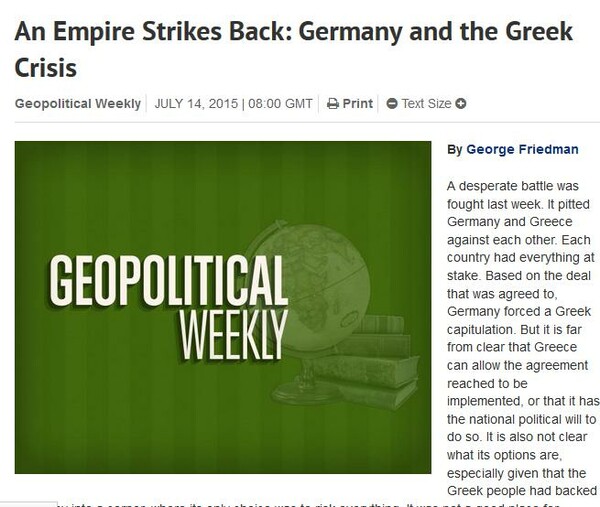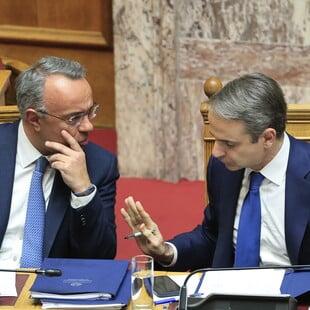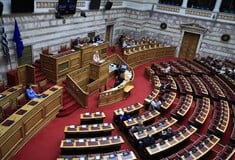Οι διαπραγματεύσεις Ελλάδας-Γερμανίας (και όχι Ευρώπης-Ελλάδας) διέπονταν από την εκδικητικότητα του Βερολίνου έναντι της Αθήνας, σημειώνει ο γνωστός αναλυτής και καθηγητής Τζορτζ Φρίντμαν ο οποίος αναφέρει ότι η Ελλάδα συνθηκολόγησε. Τονίζει μάλιστα ότι η Ελλάδα δεν αντιμετωπίζει μόνο τη λιτότητα, όπως γινόταν μέχρι τώρα, αλλά μια κυβέρνηση-τη Γερμανική.
Ο καθηγητής τονίζει ότι πρόκειται για κατάσταση εκρηκτική που αναζωπυρώνει της μνήμες της Κατοχής και που ακριβώς για αυτό θα ενισχύσει τις φωνές για έξοδο από το ευρώ.
Ο Φρίτμαν τονίζει επίσης ότι οι Γερμανοί χρησιμοποίησαν όλη την ισχύ τους επειδή φοβόταν το ελληνικό Grexit ως βλαβερό για την εξαγωγική τους παντοδυναμία ενώ εκφράζει τις αμφιβολίες του για το κατά πόσο η ελληνική κυβέρνηση θα μπορέσει να εκπληρώσει τις δεσμεύσεις. Επισημαίνει ότι οι γερμανοί έδωσαν μια παράσταση με έξοχο τρόπο πάνω σε μια ανούσια πράξη.
Ο διάσημος αναλυτής αναφέρει ότι επίτηδες δεν χρησιμοποίησε το δίπτυχο Ελλάδα-Ευρώπη αλλά μίλησε για Ελλάδα-Γερμανία. «Οι Γερμανοί έχουν εδώ και καιρό γίνει η ελέγχουσα οντότητα της Ευρωπαϊκής Ένωσης. Αυτή τη φορά, δεν κρύφτηκαν και χρημιμοποίησαν όλη την αγριότητά τους. Στην πραγματικότητα ύψωσαν το λάβαρο της γερμανικής υπεροχής απέναντι στην αντιπολίτευση…Κι αν έκαναν διαβουλεύσεις με Γάλλους και Ιταλούς στο τέλος αυτοί αποφάσισαν τη διαπραγματευτική θέση. Η διαπραγμάτευση αυτή ήταν στο πλαίσιο της Ευρωπαϊκής Ένωσης, αλλά ήταν μια γερμανική διαπραγμάτευση.

Όλο το κείμενο στα Αγγλικά:
A desperate battle was fought last week. It pitted Germany and Greece against each other. Each country had everything at stake. Based on the deal that was agreed to, Germany forced a Greek capitulation. But it is far from clear that Greece can allow the agreement reached to be implemented, or that it has the national political will to do so. It is also not clear what its options are, especially given that the Greek people had backed Germany into a corner, where its only choice was to risk everything. It was not a good place for Greece to put the Germans. They struck back with vengeance.
The key event was the Greek referendum on the European Union's demand for further austerity in exchange for infusions of cash to save the Greek banking system. The Syriza party had called the vote to strengthen its hand in dealing with the European demands. The Greek government's view was that the European terms would save Greece from immediate disaster but at the cost of impoverishing the country in the long term. The austerity measures demanded would, in their view, make any sort of recovery impossible. Facing a choice between a short-term catastrophe in the banking system and long-term misery, the Greeks saw themselves in an impossible position.
In chess, when your position is hopeless, one solution is to knock over the chessboard. That is what the Greeks tried to do with the referendum. If the vote was lost, then the government could capitulate to German demands and claim it was the will of the people. But if the vote went the way it did, the Greek leaders could go to the European Union and argue that broad relaxation of austerity was not merely the position of the government, but also the sovereign will of the Greek people.
The European Union is founded on the dual principles of an irrevocable community of nations that have joined together but have retained their national sovereignty. The Greeks were demonstrating the national will, which the government thought would create a new chess game. Instead, the Germans chose to directly demand a cession of a significant portion of Greece's sovereignty by creating a cadre of European bureaucrats who would oversee the implementation of the agreement and take control of Greek national assets for sale to raise money. The specifics are less important than the fact that Greece invoked its sovereign right, and Germany responded by enforcing an agreement that compelled the Greeks to cede those rights.
Germany's Motivations
I've discussed the German fear extensively. Germany is a massive exporting power that depends on the European free trade zone to purchase a substantial part of its output. The Germans had a record positive balance of trade last month, of which its trade both in the eurozone as well as in the rest of the European Union was an indispensible part. For Germany, the unraveling of the European Union would directly threaten its national interest. The Greek position — particularly in the face of the Greek vote — could, in the not too distant future, result in that unraveling.
There were two sides of the Greek position that frightened the Germans. The first was that Athens was trying to use its national sovereignty to compel the European Union to allow Greece to avoid the pain of austerity. This would, in effect, shift the burden of the Greek debt from the Greeks to the European Union, which meant Germany. For the Germans, the bloc was an instrument of economic growth. If Germany accepted the principle that it had to assume responsibility for national financial problems, the European Union — which has more than a few countries with national financial problems — could drain German resources and undermine a core reason for the bloc, at least from the German point of view. If Greece demonstrated it could compel Germany to assume responsibility for the debt in the long term, it is not clear where it would have ended — and that is precisely what the Greek vote intended.
On the other hand, if the Greeks left the European Union, it would have created a precedent that would in the end shatter the bloc. If the European Union was an elective affinity, in Goethe's words, something you could enter and then leave, then the long-term viability of the bloc was in serious doubt. And there was no reason those doubts couldn't be extended to the free trade zone. If nations could withdraw from the European Union and create trade barriers, then Germany would be living in a world of tariffs, European and other. And that was the nightmare scenario for Germany.
The vote backed the Germans into a corner, as I said last week. Germany could not accept the Greek demand. It could not risk a Greek exit from the European Union. It could not appear to be frightened by an exit, and it could not be flexible. During the week, the Germans floated the idea of a temporary Greek exit from the euro. Greece owes a huge debt and needs to build its economy. What all this has to do with being in the euro or using the drachma is not clear. It is certainly not clear how it would have helped Europe or solved the immediate banking problem. The Greeks are broke, and don't have the euros to pay back loans or liquefy the banking system. The same would have been true if they left the European Union. Suggesting a temporary Grexit was a fairly meaningless act — a bravura performance by the Germans. When you desperately fear something in a negotiation, there is no better strategy than to demand that it happen.
The Resurrection of German Primacy
I have deliberately used Germany rather than the European Union as the negotiating partner with the Greeks. The Germans have long been visible as the controlling entity of the European Union. This time, they made no bones about it. Nor did they make any bones about their ferocity. In effect they raised the banner of German primacy, German national interest, and German willingness to crush the opposition. The French and the Italians, among others, questioned the German position publicly. In the end, it didn't matter. The Germans consulted with these other governments, but Berlin decided the negotiating position, because in the end it was Germany that would be most exposed by French or Italian moderation. This negotiation was in the context of the European Union, but it was a German negotiation.
And with this, the Germans did something they never wanted to do: resurrect fairly unambiguously the idea that Germany is the sovereign and dominant nation-state in Europe, and that it has the power and the will to unilaterally impose its will on another nation. Certainly the niceties of votes by finance ministers and prime ministers were adhered to, but it was the Germans who conducted the real negotiations and who imposed their will on Greece.
Germany's historical position was that it was one nation among many in the European Union. One of the prime purposes of European integration was to embed Germany in a multinational European entity so that it could develop economically but not play the role in Europe that it did between 1871 and 1945. The key to this was making certain that Germany and France were completely aligned. The fear was that German economic growth would create a unilateral German political power, and the assumption was that a multilateral organization in which France and Germany were intimately bound together would enable German growth without risking German unilateral power.
No one wanted this solution to work more than the Germans, and many of Germany's maneuvers were to save the multilateral entity. But in making these moves, Germany crossed two lines. The lesser line was that France and Germany were not linked on dealing with Greece, though they were not so far apart as to be even close to a breach. The second, and more serious, line was that the final negotiation was an exercise of unilateral German power. Several nations supported the German position from the beginning — particularly the Eastern European nations that, in addition to opposing Greece soaking up European money, do not trust Greece's relationship with Russia. Germany had allies. But it also had major powers as opponents, and these were brushed aside.
These powerful opponents were brushed aside particularly on two issues. One was any temporary infusion of cash into Greek banks. The other was the German demand, in a more extreme way than ever before, that the Greeks cede fundamental sovereignty over their national economy and, in effect, over Greece itself. Germany demanded that Greece place itself under the supervision of a foreign EU monitoring force that, as Germany demonstrated in these negotiations, ultimately would be under German control.
The Germans did not want to do this, but what a nation wants to do and what it will do are two different things. What Germany wanted was Greek submission to greater austerity in return for support for its banking system. It was not the government's position that troubled Germany the most, but the Greek referendum. If Germany forced the Greek government to capitulate, it was a conventional international negotiation. If it forced the government to capitulate in the face of the electoral mandate of the Greek public, it was in many ways an attack on national sovereignty, forcing a settlement not in opposition to the government but a direct confrontation with the electorate. The Germans could not accommodate the vote. They had to respond by demanding concessions on Greek sovereignty.
This is not over, of course. It is now up to the Greek government to implement its agreements, and it does so in the face of the Greek referendum. The situation in Greece is desperate because of the condition of the banking system. It was the pressure point that the Germans used to force Greek capitulation. But Greece is now facing not only austerity, but also foreign governance. The Germans' position is they do not trust the Greeks. They do not mean the government now, but the Greek electorate. Therefore, they want monitoring and controls. This is reasonable from the German point of view, but it will be explosive to the Greeks.
The Potential for Continental Unease
In World War II, the Germans occupied Greece. As in much of the rest of Europe, the memory of that occupation is now in the country's DNA. This will be seen as the return of German occupation, and opponents of the deal will certainly use that argument. The manner in which the deal was made and extended by the Germans to provide outside control will resurrect historical memories of German occupation. It has already started. The aggressive inflexibility of the Germans can be understood as an attitude motivated by German fears, but then Germany has always been a frightened country responding with bravado and self-confidence.
The point of the matter is not going away, and not only because the Greek response is unpredictable; poverty versus sovereignty is a heady issue, especially when the Greeks will both remain poor and lose some sovereignty. The Germans made an example of Cyprus and now Greece. The leading power of Europe will not underwrite defaulting debtors. It will demand political submission for what help is given. This is not a message that will be lost in Europe, whatever the anti-Greek feeling is now.
This is as far from what Germany wanted as can be imagined. But Greece could not live with German demands, and Germany could not live with Greek demands. In the end, the banking crisis gave Germany an irresistible tool. Now the circumstances demand that the Greeks accept austerity and transfer key elements of sovereignty to institutions under the control or heavy influence of the Germans.
What else could Germany do? What else could Greece do? The tragedy of geopolitical reality is that what will happen has little to do with what statesmen wanted when they started out.





























